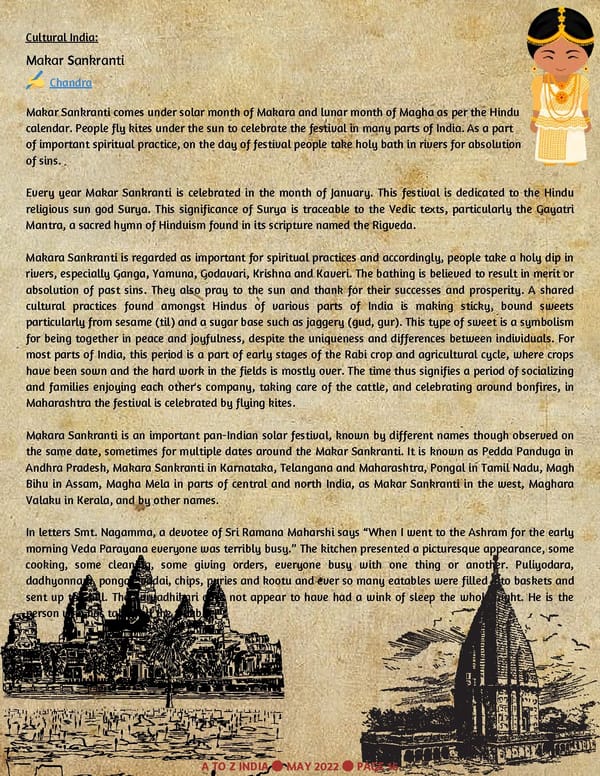Chandra Makar Sankranti comes under solar month of Makara and lunar month of Magha as per the Hindu calendar. People fly kites under the sun to celebrate the festival in many parts of India. As a part of important spiritual practice, on the day of festival people take holy bath in rivers for absolution of sins. Every year Makar Sankranti is celebrated in the month of January. This festival is dedicated to the Hindu religious sun god Surya. This significance of Surya is traceable to the Vedic texts, particularly the Gayatri Mantra, a sacred hymn of Hinduism found in its scripture named the Rigveda. Makara Sankranti is regarded as important for spiritual practices and accordingly, people take a holy dip in rivers, especially Ganga, Yamuna, Godavari, Krishna and Kaveri. The bathing is believed to result in merit or absolution of past sins. They also pray to the sun and thank for their successes and prosperity. A shared cultural practices found amongst Hindus of various parts of India is making sticky, bound sweets particularly from sesame (til) and a sugar base such as jaggery (gud, gur). This type of sweet is a symbolism for being together in peace and joyfulness, despite the uniqueness and differences between individuals. For most parts of India, this period is a part of early stages of the Rabi crop and agricultural cycle, where crops have been sown and the hard work in the fields is mostly over. The time thus signifies a period of socializing and families enjoying each other's company, taking care of the cattle, and celebrating around bonfires, in Maharashtra the festival is celebrated by flying kites. Makara Sankranti is an important pan-Indian solar festival, known by different names though observed on the same date, sometimes for multiple dates around the Makar Sankranti. It is known as Pedda Panduga in Andhra Pradesh, Makara Sankranti in Karnataka, Telangana and Maharashtra, Pongal in Tamil Nadu, Magh Bihu in Assam, Magha Mela in parts of central and north India, as Makar Sankranti in the west, Maghara Valaku in Kerala, and by other names. In letters Smt. Nagamma, a devotee of Sri Ramana Maharshi says “When I went to the Ashram for the early morning Veda Parayana everyone was terribly busy.” The kitchen presented a picturesque appearance, some cooking, some cleaning, some giving orders, everyone busy with one thing or another. Puliyodara, dadhyonnam, pongal, vadai, chips, puries and koo tu and ever so many eatables were filled into baskets and sent up the hill. The Sarvadhikari does not appear to have had a wink of sleep the whole night. He is the person who has taken all the trouble. A TO Z INDIA ● MAY 2022 ● PAGE 16 Makar Sankranti Cultural India:
 A TO Z INDIA - MAY 2022 Page 15 Page 17
A TO Z INDIA - MAY 2022 Page 15 Page 17